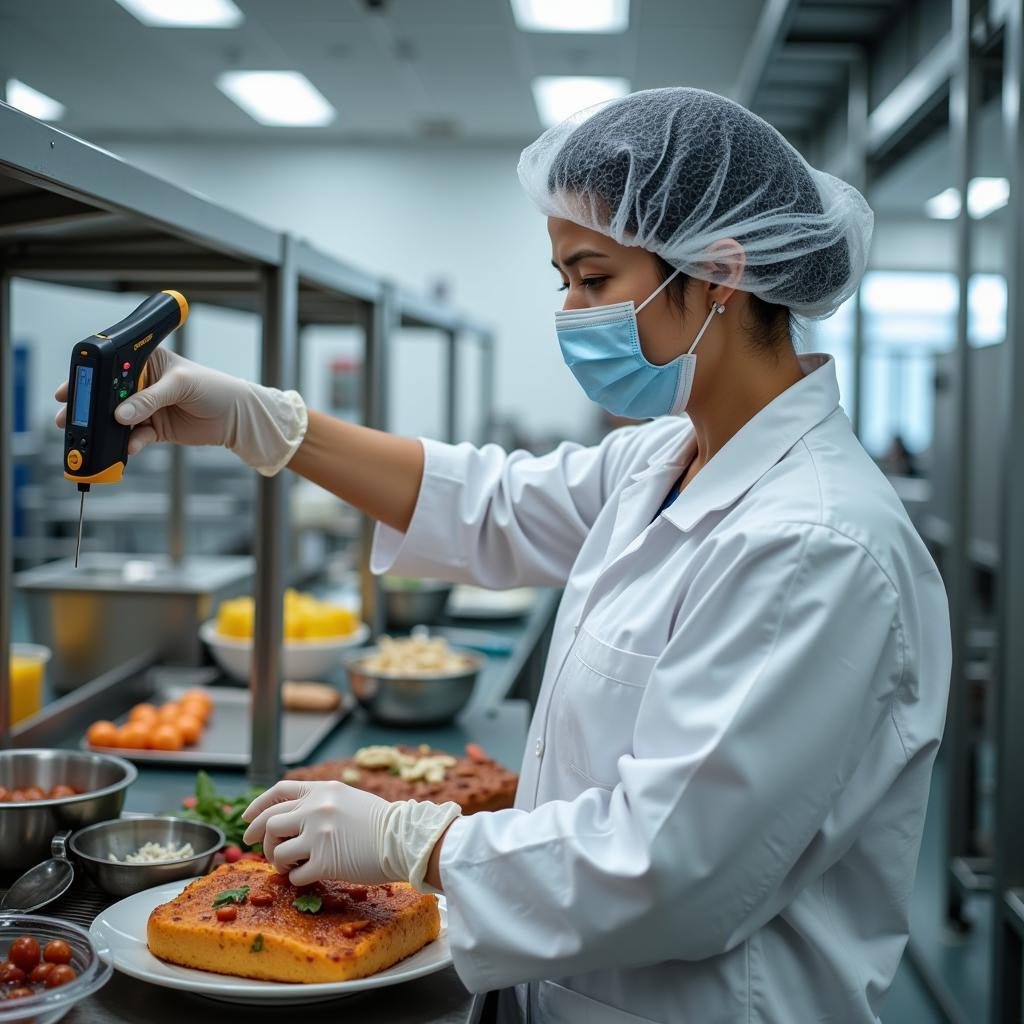A Food Safety Coordinator plays a crucial role in ensuring the health and well-being of consumers. They are the guardians of safe food practices, diligently working behind the scenes to prevent foodborne illnesses and maintain the integrity of our food supply. From farm to table, their expertise is essential in every step of the food production and service process. Let’s explore the multifaceted world of the food safety coordinator and understand why they are so vital.
Why is a Food Safety Coordinator So Important?
Food safety coordinators are responsible for developing, implementing, and maintaining food safety management systems. These systems encompass a range of procedures and protocols designed to minimize the risk of contamination and ensure compliance with regulations.  Food Safety Coordinator Inspecting Food Products Their duties often include conducting regular inspections, training staff on proper food handling techniques, monitoring storage conditions, and investigating any reported incidents of foodborne illness. Their vigilance is paramount in protecting public health and maintaining consumer trust.
Food Safety Coordinator Inspecting Food Products Their duties often include conducting regular inspections, training staff on proper food handling techniques, monitoring storage conditions, and investigating any reported incidents of foodborne illness. Their vigilance is paramount in protecting public health and maintaining consumer trust.
Key Responsibilities of a Food Safety Coordinator
A food safety coordinator wears many hats. They are educators, inspectors, investigators, and record keepers, all rolled into one. Some of their core responsibilities include:
- Developing and implementing food safety plans based on HACCP principles (Hazard Analysis and Critical Control Points).
- Training employees on safe food handling practices, including personal hygiene, proper cleaning and sanitizing procedures, and temperature control.
- Conducting regular inspections of food storage areas, preparation areas, and service areas to identify potential hazards.
- Monitoring and documenting temperature logs, cleaning schedules, and pest control activities.
- Investigating and reporting any foodborne illness incidents, taking corrective actions to prevent recurrence.
- Staying up-to-date with the latest food safety regulations and ensuring the establishment’s compliance.
“A well-trained food safety coordinator is the backbone of any food business,” says Dr. Amelia Hernandez, a leading food safety consultant. “They are the frontline defense against foodborne illnesses and play a vital role in building and maintaining a strong reputation for food safety.” Their meticulous attention to detail and commitment to safety protocols are crucial for maintaining consumer confidence.
How to Become a Food Safety Coordinator
The path to becoming a food safety coordinator typically involves a combination of education and experience. While some individuals may enter the field with a background in food science or related disciplines, many gain the necessary knowledge and skills through on-the-job training and certifications. You might want to consider a frozen food career if you’re interested in this path. Various certifications, such as those offered by accredited organizations, can enhance career prospects and demonstrate a commitment to professional development.
Essential Skills for Food Safety Coordinators
Beyond technical knowledge, a successful food safety coordinator possesses a range of soft skills that are equally important. These include:
- Excellent communication skills to effectively train staff and communicate with management.
- Strong problem-solving abilities to quickly identify and address potential hazards.
- Meticulous attention to detail and a commitment to following procedures.
- Leadership qualities to motivate staff and enforce food safety standards.
- A proactive approach to identifying and mitigating risks.
- Adaptability to changing regulations and industry best practices.
“The ability to communicate effectively is paramount for a food safety coordinator,” explains Michael Johnson, a veteran food safety inspector. “They need to be able to convey complex information in a clear and concise manner to ensure everyone understands their responsibilities.”  Food Safety Inspection Checklist This ensures that everyone is on the same page when it comes to maintaining food safety.
Food Safety Inspection Checklist This ensures that everyone is on the same page when it comes to maintaining food safety.
Conclusion
The food safety coordinator is an unsung hero of the food industry. Their dedication to upholding rigorous standards protects consumers and builds trust in the food we eat. From restaurants and grocery stores to food processing plants and catering companies, their presence is essential for ensuring the safety and integrity of our food supply. As consumers, we all benefit from their tireless efforts to keep our food safe. Those facing food insecurity might also find resources at places like the Groton Food Bank or the Chelmsford Food Pantry. Food safety is a shared responsibility, and the food safety coordinator plays a critical role in that shared commitment.
FAQ
- What qualifications do I need to become a food safety coordinator?
- What are the career prospects for food safety coordinators?
- What is the average salary of a food safety coordinator?
- What are the biggest challenges faced by food safety coordinators?
- What are some resources for staying up-to-date on food safety regulations?
- Where can I find accredited food safety certification programs?
- What are the different types of food safety audits?
Do you have more questions? For other food pantry options, you might check out the Grace Baptist Church Food Pantry or the Shared Blessings Food Pantry.
When you need support, please contact Phone Number: 02437655121, Email: [email protected] Or visit us at: 3PGH+8R9, ĐT70A, thôn Trung, Bắc Từ Liêm, Hà Nội, Việt Nam. We have a 24/7 customer service team.